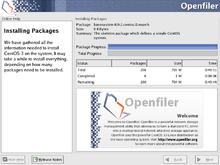Openfiler
| Developer(s) | Openfiler |
|---|---|
| Stable release | 2.99 (April 13, 2011) [±] |
| Operating system | Linux |
| Platform | i386/AMD64 |
| Type | Computer storage |
| License | GPL v2 |
| Website | openfiler.com |
Openfiler is an operating system that provides file-based network-attached storage and block-based storage area network. It was created by Xinit Systems, and is based on the rPath Linux distribution. It is free software licensed under the GNU General Public License version 2. Its software stack interfaces with open source third-party software.
History

The Openfiler codebase was started at Xinit Systems in 2001. The company created a project and donated the codebase to it in October 2003.
The first public release of Openfiler was made in May 2004.
Hardware requirements
Minimum
Openfiler needs at least a 500 MHz CPU, 256 MB of RAM, 10 GB hard disk space (8 GB for OS installation and 2 GB for swap space), an optical drive (for local installation) and an Ethernet like network interface.[1]
Optimal
A 64 bit processor with 1.6 GHz or more, 2 GB of RAM, 10 GB of hard disk space (8 GB for OS installation plus 2 GB for swap space) and a hardware RAID disk array controller is recommended for optimal performance.[2]
Features
Networking protocols supported by Openfiler include: NFS, SMB/CIFS, HTTP/WebDAV, FTP and iSCSI (initiator and target). Network directories supported by Openfiler include NIS, LDAP (with support for SMB/CIFS encrypted passwords), Active Directory (in native and mixed modes), Windows NT 4 domain controller and Hesiod. Authentication protocols include Kerberos 5. Openfiler includes support for volume-based partitioning, ext3, JFS and XFS as on-disk native filesystems, point-in-time snapshots with scheduling, quota-based resource allocation, and a single unified interface for share management which makes allocating shares for various network file-system protocols easy.
The following are just some of the features currently available (unless indicated otherwise) in Openfiler:
- Block-based virtualization
- Point-in-time snapshot support with scheduling
- Online volume size expansion (testing)
- Volume usage reporting
- Support for multiple volume groups for optimal storage allocation
- iSCSI initiator (manual currently)
- Volume migration & replication (manual currently)
- Accounts management
- Authentication using Pluggable Authentication Modules, configured from the web-interface
- NIS, LDAP, Hesiod, Active Directory (native and mixed modes), NT4 domain controller; no local user management available for shares
- Guest/public account support
- Quota / resource allocation
- Per-volume group-quota management for space and files
- Per-volume user-quota management for space and files
- Per-volume guest-quota management for space and files
- User and group templates support for quota allocation
- Share management
- Per-volume based share creation
- Multi-level share directory tree
- Multi-group based access control on a per-share basis
- Multi-host/network based access control on a per-share basis
- Per-share service activation (NFS, SMB/CIFS, HTTP/WebDAV, FTP)
- Support for auto-created SMB home directories
- Industry-standard protocol suite
- CIFS/SMB support for Microsoft Windows-based clients
- NFSv3 support for all UNIX clients with support for ACL protocol extensions
- NFSv4 support (testing)
- FTP support
- WebDAV and HTTP 1.1 support
- Linux distribution back-end for any other customizations
- Open source provides you the option to modify and deploy software as you see fit
See also
- Celerra, a commercial proprietary NAS solution - development discontinued in early 2012
- NetApp filer, a commercial proprietary filer
- FreeNAS, a FreeBSD based free and Open Source NAS solution
- OpenMediaVault — an out-of-the-box Linux NAS solution developed by a former FreeNAS developer, based upon Debian Linux (previous name: CoreNAS)
- Gluster
- NASLite
- NAS4Free — a reliable network-attached storage (NAS) server software.
- NexentaStor - Advanced enterprise-level NAS software solution (Debian/OpenSolaris-based)
- Open-E - Unified file and block storage management software
References
- Bill Childers (May 2009) OpenFiler: an Open-Source Network Storage Appliance, Linux Journal issue 181
- Jennifer Schiff (June 24, 2009) Linux-Powered Enterprise Storage: Openfiler, LinuxPlanet
- Rick Grehan (February 24, 2009) More specialty Linuxes to the rescue. OpenFiler, Computerworld
- Cory Buford (September 10, 2008) Turn your machine into enterprise storage with Openfiler, Linux.com
- Steven J. Vaughan-Nichols, (Sep. 20, 2006) Openfiler simplifies Linux NAS and SAN, Linux-Watch
- Chris Mellor (4 Nov 2003) Open Source NAS with SAN possibly coming, Techworld
Further reading
- Darrell Dunn (October 19, 2007) Low-Cost Storage Tools: Open-Source Projects Provide Increasing Choices, Processor (magazine), Vol.29 Issue 42, Page 12 in print issue
- Deni Connor (February 23, 2007) 10 free storage utilities. Some software is truly offered without strings, Computerworld
External links
- Openfiler official homepage
- Openfiler project website
- Openfiler vs FreeNAS: Tips for building your own NAS